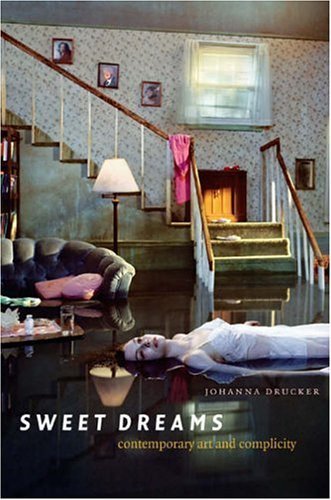Here's an interesting new publication:
Sweet Dreams : Contemporary Art and Complicity
by Johanna Drucker
264 pages
University Of Chicago Press (July 15, 2005)
ISBN: 0226165043
via Amazon:
[...] Calling for a revamping of the academic critical vocabulary used to discuss art into one more befitting current creative practices, Drucker argues that contemporary art is fully engaged with material culture--yet still struggling to escape the oppositional legacy of the early twentieth-century avant-garde.
Drucker shows that artists today are aware of working within the ideologies of mainstream culture and have replaced avant-garde defiance with eager complicity. Finding their materials at flea markets or exploring celebrity culture, contemporary artists have created a vibrantly participatory movement that exudes enthusiasm and affirmation--all while critics continue to cling to an outmoded vocabulary of opposition and radical negativity that defined modernism's avant-garde. At the cutting edge of new media research, Drucker surveys a wide range of exciting contemporary artists, demonstrating their clear departure from the past and petitioning viewers and critics to shift their terms and sensibilities as well. Sweet Dreams is a testament to the creative processes and self-conscious heterogeneity of art today as well as a revolutionary effort to solicit collaboration that will encourage the production of imaginative thought and contribute to contemporary life.
via Artnet, 9/9/05:
Book Report
by Walter Robinson [excerpt]
Communism, fascism - does capitalism have a place in this pantheon of art and ideology? Not really, though Johanna Drucker’s Sweet Dreams: Contemporary Art and Complicity (University of Chicago Press, 2005, $40) promises to focus on the ways that contemporary art (from the 1990s till now) has surrendered to the temptations of sugary mass-market culture.
Pinups by Vanessa Beecroft and Lisa Yuskavage, heaps of consumer goods by Jason Rhoades and Jessica Stockholder, assorted engagements with media, technology, spectacle, identity, branding and the like -- artists have given up their stance of avant-garde opposition, Drucker says, and now just want to get along.
What’s more, she doesn’t think it’s a bad thing. "The unblindered gaze, willing to inquire into the complicit relation between art and its ideological condition (of production, reception, evaluation, effect, even formal composition and conception), will find a rich and fertile field."
Alas, her argument is ultimately unremarkable, though there’s plenty of fireworks along the way, some 292 pages of academic hash-slinging. A much-published author on artists’ books, Drucker is a former professor at Yale and now heads a media studies program at the University of Virginia. This view from the academy has two amusing consequences, amusing at least to those of us in the journalistic trenches. One, her range of artists wanders far from the A List (i.e., many of them should be so lucky as to be "complicit" with "capital"); and two, she spends much energy sparring with something that she calls "the October position," as if that superannuated journal still had any heft.
Is contemporary art just another branch of the culture industry, or does the avant-garde somehow pierce the veil of capitalist ideology? That question remains unanswered, though curiously, the cover illustration for Sweet Dreams is Gregory Crewdson’s "Ophelia" photograph from 2001, an X-Files-style image of a young woman in a white nightie floating in a flooded middle-brow living room, a picture that seems . . . ambiguous in the shadow of Hurricane Katrina. (Even worse, the weather service has picked Ophelia as the name for the next hurricane on the horizon.) Coincidence?
Originally posted on NEWSgrist by joy garnett




